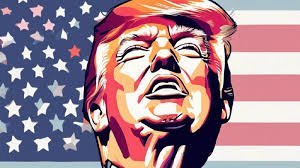Sebastian Karani Asava
A week ago, I wrote an opinion article for Citizen Digital of Royal Media Services in Kenya, exploring the risks of Africa’s overreliance on foreign aid, particularly from the United States.
I warned that Trump’s withdrawal from international commitments—such as cutting WHO funding and enforcing strict deportation policies—should prompt African nations to rethink their economic and diplomatic strategies.
The United States, under President Donald Trump’s leadership, is once again prioritizing an “America First” agenda, signaling a retreat from many important global responsibilities.
The consequences of this shift will be far-reaching, affecting international institutions, aid-dependent nations, and global stability.
Trump’s actions, including exiting the WHO, cutting USAID funding, and implementing strict immigration policies, are already causing ripple effects. While his supporters argue these moves benefit American taxpayers, the global impact is severe.
The biblical phrase, “To whom much is given, much is required,” no longer holds relevance under Trump’s administration. The U.S. has historically been a major donor to global health initiatives, including HIV/AIDS programs in Africa. Cutting these funds could leave millions without essential treatment and healthcare support.
Additionally, mass deportations will destabilize economies that rely on remittances from diaspora populations, while Trump’s hostility toward international organizations like the UN and WHO raises concerns about the effectiveness of global governance. The world cannot afford to wait and hope for a policy shift—alternative solutions are needed urgently.
One of the biggest concerns is the dependency dilemma faced by developing nations, especially in Africa. Many economies in the Global South still rely heavily on foreign assistance for healthcare, security, and development programs.
Trump’s cuts highlight a harsh reality: dependence on a single global power is not sustainable. African nations should accelerate trade agreements within the continent, such as the African Continental Free Trade Area (AfCFTA), to reduce reliance on Western aid.
Strengthening regional partnerships with China, the European Union, and Middle Eastern countries can help fill the financial void left by U.S. disengagement.
Moving toward economic independence is critical. Additionally, local manufacturing of essential medicines, investment in homegrown industries, and boosting intra-African trade must become priorities.
As the Swahili saying goes, “Kosa sio kosa bali kurudia kosa”—a mistake is not a mistake, but repeating it is.” Africa cannot afford to make the same mistake again.
Argentina’s recent decision to exit the WHO is another signal that global power dynamics are shifting. The days of relying on the United States as the primary benefactor for aid and development support are coming to an end.
Trump’s foreign policy decisions also raise concerns about the future of global health governance.
The United States has historically played a crucial role in pandemic response, funding vaccines and public health initiatives worldwide.
Its withdrawal from WHO creates a deeper crisis—can global institutions function effectively without American leadership?
Emerging power centers such as China, India, and the EU are stepping up in global health funding, but it remains unclear whether they can fully compensate for the U.S.’s financial and structural contributions. The challenge for African nations is clear—can institutions such as the Africa CDC and regional health bodies fill the void left by U.S. aid reductions?
Moreover, as governments scale back their commitments, private foundations, such as the Gates Foundation, should take a more prominent role in global health governance. The world must now prepare for a reality where the United States no longer acts as the dominant player in international public health efforts.
As the U.S. shifts toward isolationism, developing nations must take decisive action.
The Global South—comprising Africa, Latin America, and parts of Asia—must find new ways to assert itself on the world stage. Stronger economic ties between these regions can reduce dependency on Western aid and create alternative trade and financial networks.
Rather than being passive recipients of aid, African nations should actively seek influence in international policymaking institutions such as the United Nations, G20, and the World Trade Organization (WTO).
Additionally, investments in domestic resilience, ranging from food security to energy independence, should become national priorities. The global geopolitical landscape is evolving rapidly, and nations that fail to adapt will suffer the most.
Trump’s return to office signals another unpredictable chapter in international politics. While some may hope for a reversal in 2028, the reality is clear: the United States is stepping back, and the world must step up.
Who knows if Trump’s ally in charge of DOGE, billionaire Elon Musk, could one day push forth similar harsh policies as president?
For Africa and other developing regions, the choice is stark—continue relying on an increasingly disengaged superpower or take bold steps toward self-sufficiency and strategic global partnerships.
The world must prepare for a future where the United States is no longer the world’s safety net.
*The author is a Kenyan journalist, digital media strategist, and political writer. He is the founder of Edit One Kenya and the Turn Around Movement and has published the book The Turn Around. His opinion pieces have been featured in leading Kenyan media outlets. He is passionate about global politics, governance, and economic development.
The views expressed in this opinion article are solely those of the author and do not necessarily reflect the editorial stance of this publication.
The Diplomatic Insight is a digital and print magazine focusing on diplomacy, defense, and development publishing since 2009.



